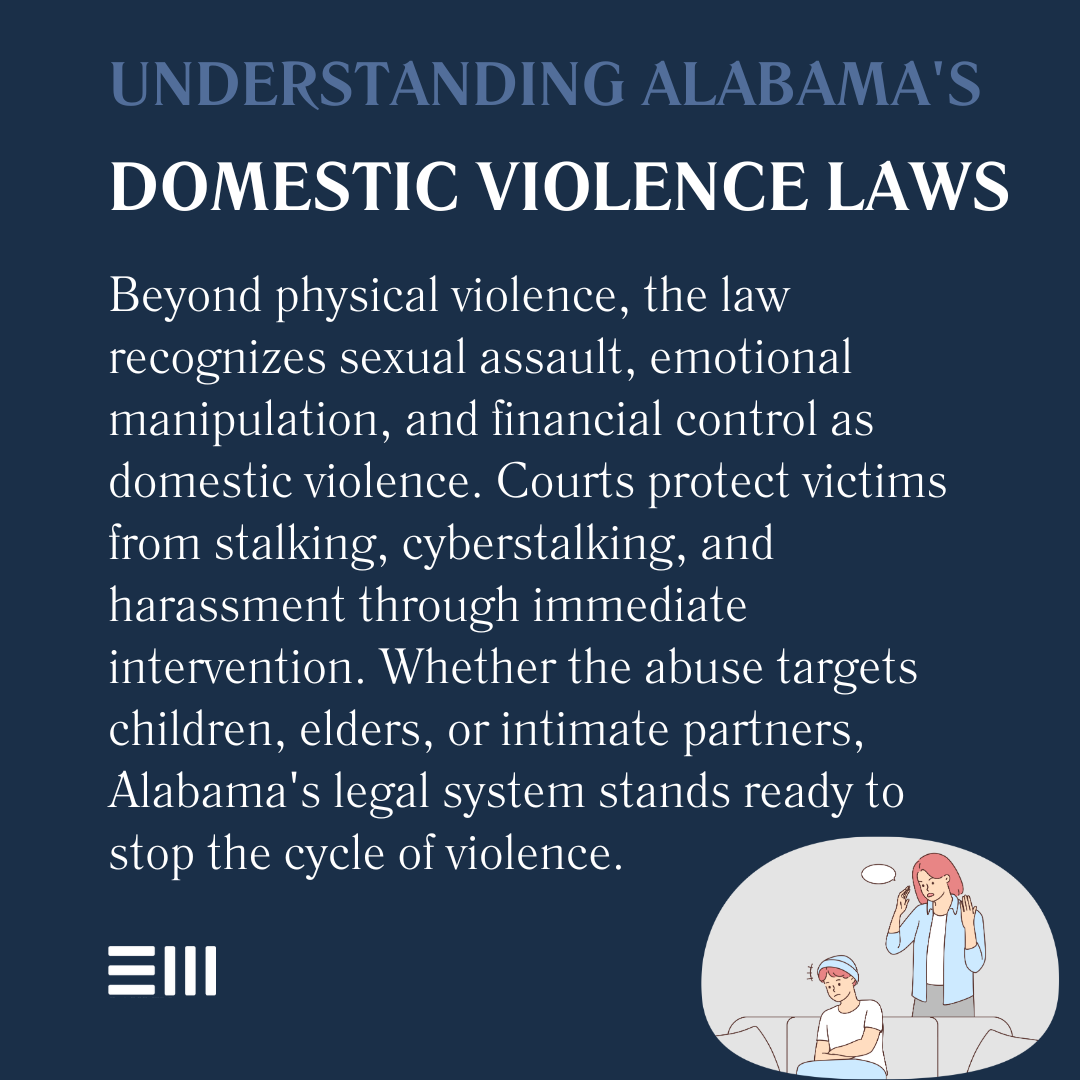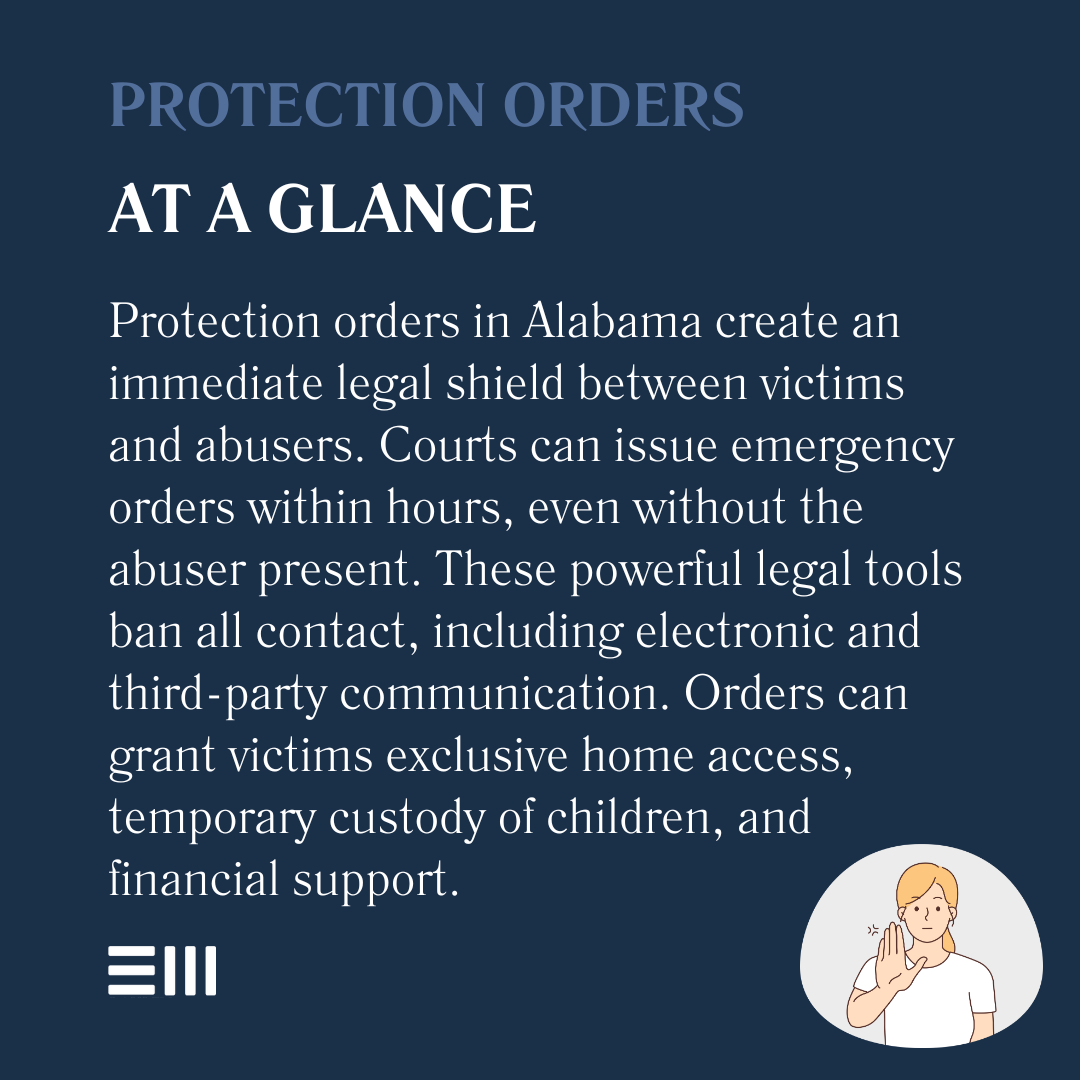In Alabama, domestic violence casts a dark shadow across thousands of lives.
In 2017, law enforcement documented 4,291 violent domestic offenses—30 families lost loved ones to domestic homicide, 283 individuals suffered sexual assault, 111 faced robbery by intimate partners, and 3,867 survived aggravated assaults in their own homes.
Every nine seconds, someone experiences domestic violence in America.
Behind these numbers are children who witness abuse, partners who live in fear, and families struggling to break free from cycles of violence.
These incidents cross all socioeconomic boundaries, from Birmingham's urban centers to rural communities in the Wiregrass region.
Alabama's courts and law enforcement agencies work daily to protect victims through a robust system of laws, protective orders, and family court interventions.
Each year, thousands of Alabamians find the courage to seek legal protection, and the state's legal system stands ready to respond with immediate, effective assistance.
Legal Protections Against Domestic Violence in Alabama
The moment domestic violence enters a household, every passing day matters. Alabama's legal framework provides immediate pathways to safety through a comprehensive system of protections, interventions, and support services.
Understanding these legal shields can make the difference between continued vulnerability and secured safety.
Alabama defines domestic violence to include:
- Physical abuse or threats of violence, including any form of bodily harm or threatened harm;
- Sexual assault or abuse, encompassing both actual and attempted sexual violence;
- Emotional and psychological abuse, including isolation tactics and verbal degradation;
- Financial exploitation and control, such as withholding access to bank accounts or forcing financial dependence;
- Stalking and cyberstalking, including social media harassment and electronic surveillance;
- Child abuse or neglect, whether physical, emotional, or psychological;
- Elder abuse within families, including financial exploitation and neglect; and
- Harassment and intimidation, including threats against family members or pets.
These legal protections reflect decades of legislative evolution and judicial precedent, creating a safety net for vulnerable families throughout Alabama. Each protection carries specific enforcement mechanisms and legal consequences for violators.
Understanding Protection Orders and Emergency Relief
When violence threatens a family's safety, Alabama courts can act within hours to establish legal barriers between abusers and victims.
Protection orders represent more than just legal documents—they create enforceable shields backed by law enforcement and judicial authority.
Available protective measures include:
- Emergency ex parte orders, obtainable without the abuser's presence;
- Temporary restraining orders, providing immediate protection for up to 14 days;
- Permanent protection orders, lasting up to one year with renewal options;
- No-contact provisions, including electronic and third-party communication bans;
- Temporary custody arrangements to protect children from exposure to violence;
- Financial support orders ensuring economic stability during separation;
- Property possession rights, including exclusive use of shared residences; and
- Law enforcement escort services for retrieving personal belongings.
Protection orders demonstrate Alabama's commitment to swift, decisive action against domestic violence. These legal tools provide the breathing room necessary for families to plan their next steps toward safety and stability.
Family Court Proceedings and Domestic Violence
When domestic violence intersects with family court matters, Alabama law requires judges to prioritize safety while ensuring due process.
Every decision, from custody arrangements to property division, must reflect the reality of domestic violence's impact on family dynamics.
Key family court factors include:
- Child custody and visitation rights, with safety as the paramount concern;
- Property division considerations, including the impact of economic abuse;
- Spousal support determinations based on financial control patterns;
- Child support adjustments reflecting safety-related expenses;
- Supervised visitation requirements when children's safety is at risk;
- Relocation permissions for victims seeking safety in new locations;
- Counseling mandates for parties involved in domestic violence; and
- Safety plan implementations coordinated with law enforcement.
Family courts balance multiple competing interests while maintaining a focus on family safety and stability. These proceedings often represent turning points in families' journeys toward healing.
Available Support Services and Resources
Alabama maintains an extensive network of support services designed to help families navigate both immediate crises and long-term recovery.
These resources bridge the gap between legal protections and practical needs.
Available resources include:
- 24-hour crisis hotlines staffed by trained advocates;
- Emergency shelters providing immediate safe haven;
- Legal aid services offering free or reduced-cost representation;
- Counseling programs for adults and children;
- Support groups connecting survivors with peers;
- Financial assistance for emergency needs;
- Housing programs facilitating fresh starts; and
- Job training services supporting economic independence.
This comprehensive support system reflects Alabama's commitment to protecting vulnerable families. Each service plays a vital role in helping survivors rebuild their lives.
Common Questions About Domestic Violence and Family Law in Alabama
Every day, Alabamians seek answers about their rights and options regarding domestic violence.
Here are detailed responses to frequently asked questions about protection and legal recourse.
How Long Does a Protection Order Last in Alabama?
Protection orders typically extend for one year, but courts can grant extensions based on continuing safety concerns. Emergency orders take effect immediately and remain valid until a full hearing occurs.
What Evidence Do I Need for a Protection Order?
Courts accept various forms of evidence, including police reports, medical records, witness statements, photographs, threatening messages, and personal testimony.
Documentation strengthens cases but isn't always required for emergency orders.
Can I Get Emergency Custody of My Children?
Alabama courts can grant immediate emergency custody when evidence suggests children face danger. These orders typically remain in effect pending full custody hearings.
Will My Address Be Protected?
The Alabama Address Confidentiality Program shields survivors' locations from public records. Participants receive a substitute address for official documents while maintaining actual location privacy.
How Does Domestic Violence Affect Divorce Proceedings?
Evidence of domestic violence significantly influences divorce terms, potentially affecting property division, alimony awards, custody arrangements, and visitation schedules.
What if My Abuser Violates a Protection Order?
Protection order violations trigger immediate criminal consequences, including possible arrest and incarceration. Multiple violations often result in enhanced penalties.
Secure Your Safety Today
Your well-being and security shouldn't wait another day. Our experienced attorneys understand the complexities of domestic violence cases and stand ready to protect your rights through immediate legal action.
Contact our office today for immediate assistance. Your conversation with us remains completely confidential, and we can meet in a secure location if needed.
Don't wait until the situation escalates—reach out now to explore your legal options and take the first step toward a safer future.


